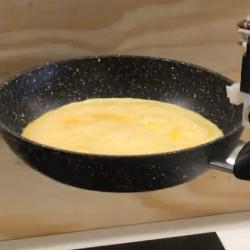The researchers, from the University of Cambridge in collaboration with domestic appliance company Beko, used machine learning to train the robot to account for highly subjective matters of taste. The results are reported in the journal IEEE Robotics and Automation Letters, and will be available online as part of the virtual IEEE International Conference on Robotics and Automation (ICRA 2020).
A robot that can cook has been an aspiration of sci-fi authors, futurists, and scientists for decades. As artificial intelligence techniques have advanced, commercial companies have built prototype robot chefs, although none of these are currently commercially available, and they lag well behind their human counterparts in terms of skill.
“Cooking is a really interesting problem for roboticists, as humans can never be totally objective when it comes to food, so how do we as scientists assess whether the robot has done a good job?” said Dr Fumiya Iida from Cambridge’s Department of Engineering, who led the research.
Teaching a robot to prepare and cook food is a challenging task, since it must deal with complex problems in robot manipulation, computer vision, sensing and human-robot interaction, and produce a consistent end product.
In addition, taste differs from person to person – cooking is a qualitative task, while robots generally excel at quantitative tasks. Since taste is not universal, universal solutions don’t exist. Unlike other optimisation problems, special tools need to be developed for robots to prepare food.
Other research groups have trained robots to make cookies, pancakes and even pizza, but these robot chefs have not been optimised for the many subjective variables involved in cooking.
Egg dishes, omelettes in particular, have long been considered a test of culinary skill. A popular piece of French culinary mythology states that each of the one hundred pleats in a chef’s hat represents a different way to cook an egg, although the exact origin of this adage is unknown.
“An omelette is one of those dishes that is easy to make, but difficult to make well,” said Iida. “We thought it would be an ideal test to improve the abilities of a robot chef, and optimise for taste, texture, smell and appearance.”
In partnership with Beko, Iida and his colleagues trained their robot chef to prepare an omelette, from cracking the eggs through to plating the finished dish. The work was performed in Cambridge’s Department of Engineering, using a test kitchen supplied by Beko plc and Symphony Group.
Watch a video and read the full story
Reproduced courtesy of the University of Cambridge
